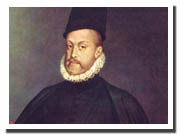Spain Travel & Tourism Guide
NextGen Day feature Africa links, Africa resources and large selection of Africa budget airlines, Africa chartered planes, Africa sea cruises, Africa ferries, Africa travel agencies, Africa land transports and Africa attractions including Africa beaches, Africa medical tourism, Africa retirement homes, Africa historical and Africa pilgrimage tours. NextGen Day offers travel tips and information for top travel places and best destinations in Africa, Asia, Australia, Europe, Middle East and United States of America.
Spain History - Imperial Spain
|
The unification of the kingdoms of Aragon and Castile laid the basis for modern Spain and the Spanish Empire. Spain was Europe's leading power throughout the 16th century and most of the 17th century, a position reinforced by trade and wealth from colonial possessions. Spain reached its apogee during the reigns of the first two Spanish Habsburgs - Charles I (1516–1556) and Philip II (1556–1598). This period also saw the Italian Wars, the revolt of the comuneros, the Dutch revolt, the Morisco revolt, clashes with the Ottomans, the Anglo-Spanish war and wars with France.
The Spanish Empire expanded to include most parts of South and Central America, Mexico, southern and western portions of today's United States, the Philippines, Guam and the Mariana Islands in Eastern Asia, parts of northern Italy, southern Italy, Sicily, cities in Northern Africa, as well as parts of France, modern Germany, Belgium, Luxembourg, and the Netherlands.
It was the first empire about which it was said that the sun never set. This was an age of discovery, with daring explorations by sea and by land, the opening-up of new trade routes across oceans, conquests and the beginnings of European colonialism. Along with the arrival of precious metals, spices, luxuries, and new agricultural plants, Spanish and other explorers brought back knowledge from the New World, playing a leading part in transforming Europeans understanding of the globe. The cultural efflorescence witnessed is now referred to as the Spanish Golden Age. The rise of humanism, the Protestant Reformation and new geographical discoveries raised issues addressed by the influential intellectual movement now known as the School of Salamanca.
In the late 16th century and first half of the 17th century, Spain was confronted by unrelenting challenges from all sides. Barbary pirates under the aegis of the rapidly growing Ottoman empire, disrupted life in many coastal areas through their slave raids and renewed the threat of an Islamic invasion. This at a time when Spain was often at war with France in Italy and elsewhere. Later the Protestant Reformation schism from the Catholic Church dragged the kingdom ever more deeply into the mire of religiously charged wars. The result was a country forced into ever expanding military efforts across Europe and in the Mediterranean.
By the middle decades of a war and plague ridden 17th century Europe, the effects of the strain began to show. The Spanish Habsburgs had enmeshed the country in the continent wide religious-political conflicts. These conflicts drained it of resources and undermined the European economy generally. Spain managed to hold on to most of the scattered Habsburg empire, and help the imperial forces of the Holy Roman Empire reverse a large part of the advances made by Protestant forces, but it was finally forced to recognise the separation of Portugal and the Netherlands, and eventually suffered some serious military reverses to France in the latter stages of the immensely destructive, Europe-wide Thirty Years War.
In the latter half of the 17th century, Spain went into a gradual relative decline, during which it surrendered a number of small territories to France. However Spain maintained and enlarged its vast overseas empire, which remained intact until the beginning of the 19th century.
The decline culminated in a controversy over succession to the throne which consumed the first years of the 18th century. The War of Spanish Succession, a wide ranging international conflict combined with a civil war, cost Spain its European possessions and its position as one of the leading powers on the Continent.
During this war, a new dynasty, the French Bourbons was installed. Long united only by the Crown, a true Spanish state was established when the first Bourbon king Philip V of Spain united Castile and Aragon into a single state, abolishing many of the regional privileges.
The 18th century saw a gradual recovery and an increase in prosperity through much of the empire. The new Bourbon monarchy drew on the French system of modernising the administration and the economy. Enlightenment ideas began to gain ground among some of the kingdom's elite and monarchy. Towards the end of the century trade finally began growing strongly. Military assistance for the rebellious British colonies in the American War of Independence improved Spain's international standing.
Source: Wikipedia Encyclopedia

Spain hotels
<1> <2> <3> <4> <5> <6> <7> <8> <9> <10>
<11> <12> <13> <14> <15> <16> <17> <18> |
|
|

Travel Quotes: If you wish to travel far and fast, travel light. Take off all your envies, jealousies, unforgiveness, selfishness and fears. Cesare Pavese
When the traveler goes alone he gets acquainted with himself. Liberty Hyde Bailey
|
Austria, Croatia, Cyprus, France, Greece, Hungary, Iceland, Iceland, Italy, Malta, Netherlands, Norway, Poland, Portugal, Romania, Russia, Scotland, Slovakia, Slovenia, Spain, Sweden, Switzerland, Ukraine
|
ADVERTISEMENT
|



